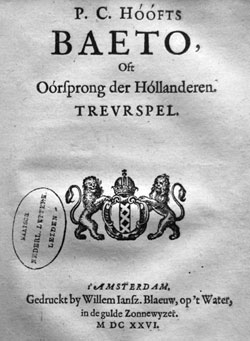P. C. Hooft
Baeto (1617)
>>Pieter Cornelisz. Hooft (1581-1647), apart from being a famous poet, was
also a prudent politician. The son of the Amsterdam burgomaster Cornelis Pietersz. Hooft, he became Baljuw of the Gooiland region, and Drost of
the town of Muiden in 1609, and lived in Muiden Castle. ##Hooft’s political awareness is apparent in his historical writings, as well as in
some of his plays. Most prominent among the latter group is Baeto (1617).

>P. C. Hooft, Baeto (1626)
Its potentially controversial contents postponed Baeto`s appearance almost ten years.
Based on Tacitus’ description of the Batavians – Hooft claimed to have read Tacitus’ works no less than 52 times – he
described the rise to prominence of a fictional ancestor of the Dutch, Baeto.
Like >Grotius, Hooft insisted on the direct connection between the Batavians and the inhabitants of the
early 17th century Dutch Republic. One of his protagonists predicts:
Baeto, vss. 1429-34:
“There you [=Baeto] shall found an able people
To last throughout the centuries
Baetauwers shall first be their name:
Hollanders thereafter, with their neighbours:
Which shall in both peace, and in war, and in everything else
Be outstanding”.
Hooft, however, in contrast to Grotius, believed that power can best be given to a sovereign:
Baeto, vss. 1203-05:
“It is most fitting that the sovereign has supreme power in everything;
That he keeps his people together, and protects them from falling:
Just like, from ancient times, it has suited the Catten”.
In one of the play’s final scenes, Baeto accepts the will of the people, and is crowned king of the ‘Baethauwers’:
Baeto, vss. 1495-1503:
BURGERHART
“And we shall find ourselves a place, where no one can rule
Over us. Thence you [=Baeto] will be free to accept our free people
in custody: and we shall choose him, whom
We trust to be the most acceptable ruler,
To accept sovereignty over us”.
REI VAN SOLDATEN
“It is our will.
ZEGHEMOND
Give
the people a God on earth”.
BAETO
“I do not have the power to refuse your wishes”.
BURGERHART
“Then let us accept this sovereign onto this shield.
Lift up”.
Although based on the same texts and on the same myth, the interpretations of Grotius and Hooft about the future composition of the Dutch Republic
are fundementally different, even at odds with each other. Hooft, whose ideas about the preferred form of government had earlier been in line with
those of Grotius, notably in his play #Geeraerdt van Velsen (1613), was well aware of the controversial nature of Baeto. The text,
conceived in 1617, was not published until 1626.
>For artists’ interpretations of the Batavian myth in the 17th century, click here.
|



